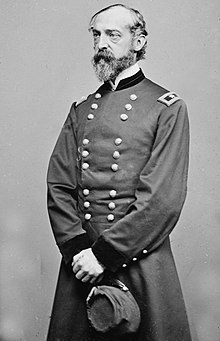George Meade
United States Army general and civil engineer (1815–1872)
George Gordon Meade (31 December 1815 – 6 November 1872) was a career U.S. Army officer and engineer involved in coastal construction. During the American Civil War he served as a Union general, and is most famous for defeating Robert E. Lee at the Battle of Gettysburg.

| This article about a person or group of people is a stub. You can help out with Wikiquote by expanding it! |
Quotes
edit- War is very uncertain in its results, and often when affairs look most desperate they suddenly assume a more hopeful state.
- Letter to his wife Margaretta (11 June 1863); published in The Life and Letters of George Gordon Meade (1913)
- The country looks to this army to relieve it from the devastation and disgrace of a hostile invasion. Whatever fatigues and sacrifices we may be called upon to undergo, let us have in view constantly the magnitude of the interests involved, and let each man determine to do his duty, leaving to an all-controlling Providence the decision of the contest.
- Address on Taking Command of the Army of the Potomac (June 28, 1863); published in The Civil War: Great Speeches and Documents (2006)
Quotes about Meade
edit- He had to do the honorable thing, he understood that. Today of all days, it was vital to remain a gentleman, to speak faithfully and betray no emotions to his career's executioner. His family seemed ever destined for disappointment: his father, now him. Yet, he had done much, giving them all the victory they needed, that victory and more...
Only to have a low cabal poison Lincoln against him. Liars. Devils. Whoremongers. Intimating, in the wake of Mine Run, that he sympathized with the Confederacy, that he was unfit to command, even that he was cowardly. All because he would not squander thousands of men to no purpose. Oh, yes. Had he overruled all military judgment, common sense, and decency and ordered Warren to attack, had he sacrificed five thousand soldiers in an act of folly, he might have been forgiven. But powerful men never spotted near a battlefield had seized upon his refusal to charge Lee's entrenchments, coiling like snakes to strike his reputation. Their ardor for slaughter repelled him.
Perhaps he was better off being relieved. He could put this filth behind him, this infinite human vice of cold ambition. He could not understand how men could tell a public lie and then stand by it. He was not made for the politics of command, not for politics of any kind. He knew that his notions of honor seemed quaint, even laughable, to the likes of Sickles, Hooker, and Butterfield. But he could not imagine a life lived another way.- Ralph Peters, Hell or Richmond: A Novel (2013), New York: Tom Doherty Associates, LLC, p. 18-19
- A mighty burst of rain assaulted the canvas, conjuring Gettysburg: his hour of glory, of triumph. The smoke, confusion, and carnage had calmed to reveal his army victorious. Lee had been defeated. Lee! His elation on that July afternoon had soared beyond all words, beyond his deathly exhaustion, and he had thought, mistakenly, that all might be well thereafter. Only to spend the night wrapped in an oilcloth, sitting on a rock amid the mud, under a tree that channeled the rain into torrents. Every roof had been required for the wounded his victory cost. The wounded, in their legions.
Damn Washington, and damn the New York papers. None of the men in frock coats and cravats understood the human side of an army. How they had howled- and were howling still- because he had not chased Lee like an ill-trained dog. They refused to hear that three hard days of battle had left tens of thousands of wounded men in his care and thousands more as prisoners in his hands. They did not want to hear that his army, too, had been mauled and thrown into confusion, that officers had been slaughtered by the hundredfold, that ammunition pouches and caissons had been emptied, that entire divisions had nothing to eat and no water untainted by blood, that the corpses of the brave baked in the sun, or simply that he had done the best he could. The Army of the Potomac had worked a miracle, sending Lee home in shame, but it had not been wonder enough for the stay-at-homes.- Ralph Peters, Hell or Richmond: A Novel (2013), New York: Tom Doherty Associates, LLC, p. 19-20